|
|
|
Sort Order |
|
|
|
Items / Page
|
|
|
|
|
|
|
| Srl | Item |
| 1 |
ID:
147699
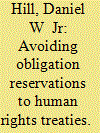

|
|
|
|
|
| Summary/Abstract |
This article examines the decisions of governments to enter reservations upon ratification of international human rights treaties. I argue that, in the context of the human rights regime, reservations are simply attempts to avoid international legal obligations where they would be consequential. I develop an explanation for their use that focuses on the following two factors: the legal constraints that already exist in domestic law and the likelihood that international agreements will be enforced by domestic courts. Using an original measure of domestic legal protection of civil, political, and personal integrity rights, I find evidence that governments are more likely to enter reservations when domestic legal standards are lax compared to those in the treaty and when judiciaries are likely to enforce treaty-based obligations. This suggests that full adoption of international human rights treaties is more likely when treaties will not create genuine domestic legal constraints and that explanations for treaty adoption and implementation must take reservations into account. It also suggests that adoption of international human rights law is best explained by the specific legal institutions that relate to domestic enforcement rather than broad distinctions between democratic/autocratic political institutions.
|
|
|
|
|
|
|
|
|
|
|
|
|
|
|
|
| 2 |
ID:
139461
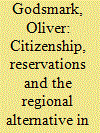

|
|
|
|
|
| Summary/Abstract |
This paper unearths an alternative paradigm through which to consider the discussions and debates between members of the Indian public, government bureaucrats and Congress Party politicians about the rights and interests of Indian citizens both before and immediately after India's Independence in 1947. It argues that much of the recent historical work on citizenship during this period has been preoccupied with issues of nationality and religious community as a result of the fallout from Partition. However, the demands and deliberations over the introduction of provincial forms of affirmative action in the all-India services at this time are indicative of a different narrative. First, many provincial representations of ‘minority’ rights often took into account differences of caste and language instead. Second, and perhaps more importantly, the term minority was employed not only to describe demographic minority status, but also to define under-represented groups in the all-India services. In doing so, these different provincial policies prioritised particular local rights to representation, in which citizenship was expressed through a regional idiom.
|
|
|
|
|
|
|
|
|
|
|
|
|
|
|
|
| 3 |
ID:
178426
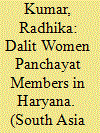

|
|
|
|
|
| Summary/Abstract |
Drawing on the latest round of elections to Panchayati Raj Institutions in the state of Haryana in 2016, this article interrogates the substantial increase in the number of Dalit women representatives, based on fieldwork in a specific village. Since both Dalit and non-Dalit women present narratives of non-participation in the functioning of the village panchayat, it is argued that the increase in Dalit women representatives was not by design, but by default, due to an amendment of the Haryana Panchayati Raj Act 2015. Overall, in the studied village, women continue to remain marginalised in the local representative bodies, and gender-based quotas have only ensured numerical visibility of women.
|
|
|
|
|
|
|
|
|
|
|
|
|
|
|
|
| 4 |
ID:
091724
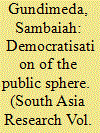

|
|
|
|
|
| Publication |
2009.
|
| Summary/Abstract |
Equality of treatment for all citizens and their cultures in public places is one of the prominent declarations of the secular Constitution of India. The hegemony of Hindu culture in the public sphere, however, reflects a dichotomy between stated declarations and social reality. Placing Dalits at the bottom of the caste hierarchy, if not outside it, 'mainstream' Hindu culture not only marginalised but importantly rejected the Dalits and their culture. This article examines the saga of the demand for a beef stall by the Dalit students in Hyderabad Central University and argues that the rejection of the culture of any community injures the human agency of that community. It is proposed that such injury can be healed only by a dialogical process, involving assertion of positivity and pride in the culture of the injured and positive recognition of such assertion by the injurer. Democratisation of the public sphere can be actualised by according representation to marginalised cultures, but in addition such representation needs to be accompanied with respect.
|
|
|
|
|
|
|
|
|
|
|
|
|
|
|
|
| 5 |
ID:
190671
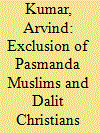

|
|
|
|
|
| Summary/Abstract |
Based on a re-reading of the Indian Constituent Assembly Debates in light of subsequent developments, this article provides new insights about the extent to which the Indian constitution allows affirmative action for redressing historical disadvantages and empowering marginalised communities. Since the post-colonial Indian state introduced the criterion of religion in the lists of Scheduled Castes (SCs), this sparked suspicions of efforts to prevent conversions, further augmenting India’s Hindu majority. The article re-examines such claims in light of the Indian Constituent Assembly Debates and subsequent Government Orders for notifying/modifying SCs. It argues that the list of SCs was never envisioned as religion-neutral, so that the exclusion of Pasmanda Muslims and Dalit Christians from the SCs is not a communal afterthought, while religion has all along not been the only or main criterion for affirmative action policies.
|
|
|
|
|
|
|
|
|
|
|
|
|
|
|
|
| 6 |
ID:
187160
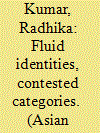

|
|
|
|
|
| Summary/Abstract |
The most recent demand for reservation quotas in India has come from the regionally dominant castes of the Jats and Patidars in the arena of education and employment. However, given their status as ‘dominant’ castes, it is paradoxical that these castes are claiming a ‘backward’ status. This demand raises questions of two kinds. Firstly, what is the nature of caste identity that they wish to leverage for purposes of gaining access to state quotas? Secondly, what are the different ways in which identities, expectations and mobilisations are shaped by electoral politics? The paper argues that ethnic identities are fluid which take on newer features and markers as they interact with categories of recognition that the state establishes. These negotiations have been exacerbated by electoral politics and the policy of economic liberalisation which have together upset dominant caste equations.
|
|
|
|
|
|
|
|
|
|
|
|
|
|
|
|
| 7 |
ID:
152619
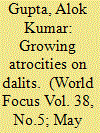

|
|
|
|
|
| Summary/Abstract |
The atrocities on Dalits at Una1 (Gujarat), the institutional murder of Rohit Vemula, and ever growing crimes against Dalits along with the statements against reservations by a section of RSS leaders, have brought once again the issues of Dalit emancipation and cast discrimination on the fore as part of an on-going national debate since independence.
|
|
|
|
|
|
|
|
|
|
|
|
|
|
|
|
| 8 |
ID:
101197
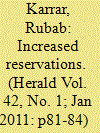

|
|
|
| 9 |
ID:
124973
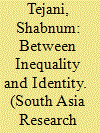

|
|
|
|
|
| Publication |
2013.
|
| Summary/Abstract |
Recent attention to the history of constitution-making in India reflects ongoing concerns about the difficulties and limitations of India's secular, democratic experiment. Scholars assessing India's secularism have pointed to the failure to separate the state from its involvement in religion from the outset. Through a study of the Constituent Assembly debates, this article suggests that the emphasis on 'religion' as the problem for secularism has been a distraction, taking the gaze away from the substantive arguments minorities were making about how their equal citizenship should be guaranteed. It remained unclear what recognition of 'minority' status was meant to achieve in postcolonial India and what it signified. In failing to recognise the claims of religious minorities for their equality, the Constituent Assembly reified their position as permanently unequal communities in the newly independent state.
|
|
|
|
|
|
|
|
|
|
|
|
|
|
|
|
| 10 |
ID:
119046
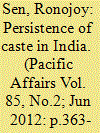

|
|
|
| 11 |
ID:
113204


|
|
|
|
|
| Publication |
2012.
|
| Summary/Abstract |
India has had political quotas for Scheduled Castes (SCs) since 1950. Using the 2004 National Election Study, this paper finds that neither SCs nor non-SCs feel that their vote is more/less efficacious living in SC constituencies. Yet, some evidence is found in this study that SCs are approached for their vote more often in SC constituencies. Overall, this suggests that quotas are neither associated with a strong positive reaction among SC voters nor a strong negative reaction among non-SC voters.
|
|
|
|
|
|
|
|
|
|
|
|
|
|
|
|
| 12 |
ID:
114014
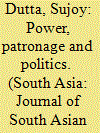

|
|
|
|
|
| Publication |
2012.
|
| Summary/Abstract |
This paper conceptualises the culture of corruption and clientelism in panchayat elections in Uttar Pradesh. The discussion is based on a year of field research on the strategies adopted by power-holders to monopolise these local bodies. The study found that patronage, influence and intimidation are used by the dominant factions to retain considerable control over the panchayats. While this in itself is not especially new, the study demonstrates the ways in which government initiatives to ensure greater transparency and representation of marginal groups-lower castes and women, in particular-through reservations continue to be cleverly subverted. A successful pradhan (headman) establishes a network of supporters and alliances, which he nurtures and rewards by brokering and embezzling funds through the institutions that he controls, instead of neutrally devolving funding to the needy sectors of the village.
|
|
|
|
|
|
|
|
|
|
|
|
|
|
|
|
| 13 |
ID:
107226
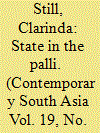

|
|
|
|
|
| Publication |
2011.
|
| Summary/Abstract |
In this paper I examine Dalit attitudes towards the state in Andhra Pradesh. In this part of India, Dalit lives and physical surroundings are quite literally shaped by the state and encounters with state officials in various guises are frequent. I argue that Dalits' dealings with the state have led them to a view which is essentially pragmatic: they see the state in terms of what they can extract from it. While their experiences with local bureaucracy are often frustrating and sometimes humiliating, they nevertheless regard the state as a resource which potentially can be tapped for their advance. Indeed, in light of the disintegration of patronage and heightened caste conflict, they are forced to turn to the state for assistance. The conflict between the two major Dalit castes themselves and between Dalits and the dominant castes over reservations also shows how central state resources are to Dalits' sense of identity. Contrary to much of the literature, then, I suggest that many of the most marginalised believe the state can assist their advance and demand that their political representatives harness state power to work in their interests.
|
|
|
|
|
|
|
|
|
|
|
|
|
|
|
|
|
|
|
|
|